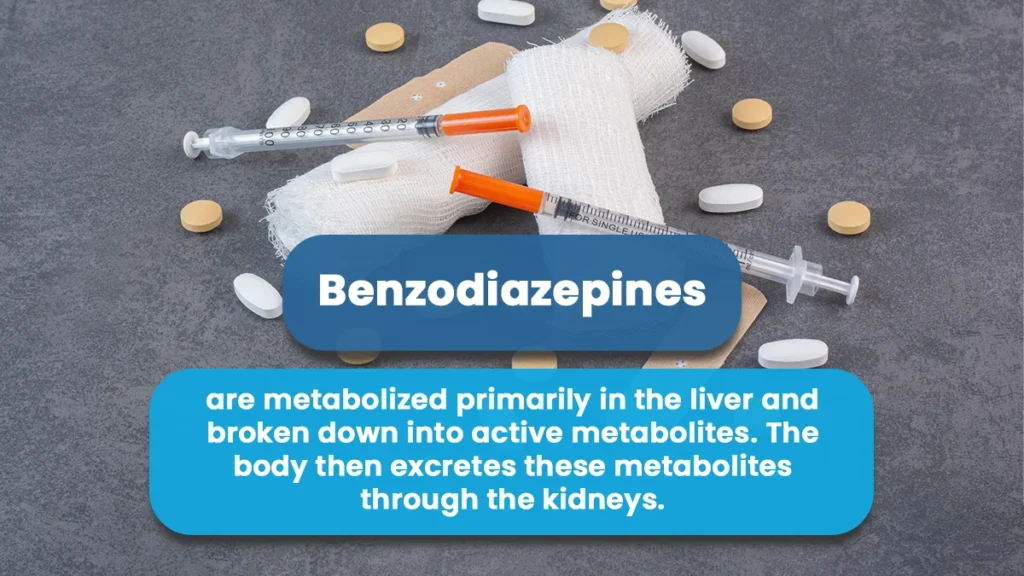Benzodiazepines are widely used medications that can have varying durations in the body. The length of time these substances remain detectable depends on several factors, including the specific type of benzodiazepine, dosage, and individual metabolism.
Benzodiazepines can stay in the system for a few days to several weeks. Short-acting versions clear faster, while long-acting ones persist longer. Metabolic rate, age, and liver function also influence detection time.
In this article, we’ll delve into the factors that affect how long benzodiazepines remain in the system, helping you gain valuable insights into their duration and effects.
Key Takeaways
Benzodiazepines can result in dependence when used for prolonged periods or at high doses. Here’s what you need to know:
- Multiple factors can influence how long benzodiazepines stay in the system.
- The pharmacokinetics of benzodiazepines vary by test method, involving their processing and detection period.
- Effective benzodiazepine detox and withdrawal management combines safety with strategic planning and support.
The Haven Detox-New Jersey offers a supportive environment where holistic care promotes thriving healing. For more details, call us at (856) 565-3102.

Benzodiazepines: Explained
Benzodiazepines are a class of medications commonly prescribed to manage anxiety, insomnia, and other conditions. They work by affecting the central nervous system to produce calming effects.
Benzodiazepines enhance the effect of a neurotransmitter called gamma-aminobutyric acid (GABA). This action reduces brain activity, resulting in a calming effect. They are often used to treat anxiety, sleep disorders, and muscle spasms.
Common Uses Of Benzodiazepines
Doctors often prescribe benzodiazepines for the short-term treatment of anxiety and panic disorders. They also treat insomnia, which can induce sleep and improve sleep quality. Additionally, healthcare providers can use these medications to treat muscle spasms and seizures.
Potential For Dependence And Abuse
Benzodiazepines can lead to dependence if used over an extended period or at high doses. Some individuals may misuse these drugs for their sedative effects, increasing the risk of abuse. It is vital to use them only as directed by a healthcare provider.
Pharmacokinetics Of Benzodiazepines
The pharmacokinetics of benzodiazepines involve their absorption, distribution, metabolism, and elimination. Identifying these processes helps determine how long these medications stay in the system.
Absorption And Onset of Action
Benzodiazepines are usually absorbed quickly from the gastrointestinal tract. Their onset of action can vary, with some providing relief within an hour.
Distribution In The Body
Once absorbed, benzodiazepines are distributed throughout the body, primarily binding to proteins in the bloodstream. They cross the blood-brain barrier, affecting the central nervous system. The extent of distribution depends on the drug’s lipid solubility and protein-binding characteristics.
Metabolism And Elimination
Benzodiazepines are metabolized primarily in the liver and broken down into active metabolites. The body then excretes these metabolites through the kidneys. The rate of metabolism and elimination varies based on the specific benzodiazepine.
Factors Influencing Pharmacokinetics
Several factors affect the processing of benzodiazepines in the body. These include liver function, age, and overall health. Drug interactions and individual metabolic rates also play a role in their pharmacokinetics.
Detection Windows For Benzodiazepines
The detection window for benzodiazepines depends on the type of test used. Each method has different sensitivity and accuracy levels for detecting these medications.
Blood Tests
Blood tests can detect benzodiazepines for up to 24-48 hours after use. Their high accuracy often leads to their use in clinical settings, which may make them impractical for routine screening.
Urine Tests
Urine tests are commonly used for detecting benzodiazepines and can identify them for up to a week. These tests are less invasive and more practical for frequent testing. They can detect both the parent drug and its metabolites.
Saliva Tests
Saliva tests can detect benzodiazepines for up to 48 hours after use. They offer a noninvasive alternative to blood and urine tests. Although less common, saliva testing is helpful for specific situations.
Hair Tests
Hair tests can provide a longer detection window, often up to 90 days. They work by analyzing the drug content in the hair shaft. This method is less affected by short-term factors but may not detect recent use.
Half-Life Of Common Benzodiazepines
The benzodiazepine half-life refers to the time it takes for the drug concentration in the blood to reduce by half. Different benzodiazepines have varying half-lives, influencing their duration in the system.
Short-Acting Benzodiazepines
Short-acting benzodiazepines, such as alprazolam, usually exhibit a half-life ranging from 6 to 12 hours. Designed for rapid onset and short-term relief, their effects and presence in the system are brief.
Intermediate-Acting Benzodiazepines
Intermediate-acting benzos, such as lorazepam, have a half-life of 10-20 hours. They balance effectiveness and duration, offering relief that lasts longer than short-acting varieties.
Long-Acting Benzodiazepines
Long-acting benzodiazepines, such as diazepam, can have a half-life of up to 100 hours. They remain in the system for extended periods, providing prolonged effects. Their long duration makes them suitable for chronic conditions.
Factors Affecting Detection Time
Various factors can influence how long benzodiazepines stay in the system. These include dosage, frequency of use, and individual characteristics.
Dosage And Frequency Of Use
Higher doses and frequent use can prolong the presence of benzodiazepines in the body. Regular use leads to accumulation, which can extend detection times. This factor is crucial for understanding how long the medication remains detectable.
Individual Metabolism And Health
An individual’s metabolic rate and overall health significantly impact how benzodiazepines are processed. Those with liver impairments may experience longer detection times. Age and general health also play essential roles.
Age, Weight, And Body Fat
Age, body weight, and fat composition affect how benzodiazepines are distributed and metabolized. Older individuals or those with higher body fat may have longer detection times. These factors also influence how the medication is stored and processed.
Drug Interactions
Other medications and substances can interact with benzodiazepines, affecting their metabolism. Certain drugs may either increase or decrease the detection time. It is essential to consider these interactions for accurate drug testing.
How Long Do Specific Benzodiazepines Stay In Your System?
Different benzodiazepines vary in how long they remain in the system. Their half-lives and other factors determine their detection times.
Alprazolam (Xanax)
Alprazolam, a short-acting benzodiazepine, stays in the system for approximately 6-12 hours. Although the effects of Xanax are short-lived, urine tests can detect it for up to a week. People frequently use this medication to relieve anxiety quickly.
Lorazepam (Ativan)
Lorazepam, commonly employed for managing anxiety and sleep disorders, exhibits an intermediate half-life ranging from 10 to 20 hours within the body. Up to a week following its use, one can detect lorazepam in the urine sample.
Diazepam (Valium)
Diazepam, a long-acting benzodiazepine, stays in the system for an extended period due to its half-life of up to 100 hours. Medical tests can detect it in the urine for several weeks. Medical professionals use diazepam for its prolonged calming effects.
Clonazepam (Klonopin)
Clonazepam, often prescribed for seizure disorders and panic attacks, has an intermediate to long half-life, ranging from 18-50 hours. Tests can detect it in urine for up to a week.
Temazepam (Restoril)
Temazepam, a short-acting benzodiazepine with a half-life of 8-20 hours, can be detected in urine for up to a week and is primarily used for treating insomnia.
Implications For Drug Testing
Drug testing is a critical aspect of managing benzodiazepine use in various settings. Learning how these tests work is vital for accurate assessments.
Employment Screening
Employment screenings often use urine or saliva tests to detect benzodiazepines. These tests help ensure safety and compliance with workplace policies. Detection times can impact hiring decisions and ongoing employment.
Medical Testing
Healthcare providers may use medical tests to monitor levels for benzodiazepine addiction treatment purposes. They provide valuable information about medication adherence and effectiveness. Accurate testing helps in managing therapeutic use.
Legal And Forensic Considerations
The detection of benzodiazepines can influence outcomes in legal and forensic settings. Forensic purposes commonly employ hair and blood tests. Accurate detection is crucial for legal proceedings and investigations.
Strategies For Detoxification And Withdrawal
Managing benzodiazepine detoxification and withdrawal requires careful planning and support. Strategies focus on safety and effectiveness.
Medical Supervision And Tapering
Detoxification should be conducted under medical supervision to ensure safety. Tapering the dose helps minimize withdrawal symptoms. Professional guidance is vital for a smooth transition.
Role Of Supportive Therapies
Supportive therapies, such as counseling and behavioral therapy, play an essential role in recovery. They provide additional support and strategies for managing withdrawal and enhance treatment effectiveness.
Managing Withdrawal Symptoms
Appropriate medical interventions and support can manage withdrawal symptoms effectively. Symptoms may include anxiety, insomnia, and muscle spasms. A comprehensive approach helps alleviate discomfort and supports recovery.
Frequently Asked Questions (FAQs)
Do benzodiazepines have a long half-life?
Benzodiazepines can have a long half-life, which varies depending on the specific medication. For instance, Xanax has a shorter half-life compared to some other benzos.
Long benzos, such as diazepam, remain in the body longer. Drug tests, including hair follicle tests, can detect these substances over extended periods. In cases of substance use disorders, drug tests might yield positive results even after the effects have worn off.
What factors influence the duration benzodiazepine stays in your system?
The duration benzodiazepine stays in your system depends on several factors. The half-life of Xanax, for instance, impacts how long the drug remains effective. Peak levels of the medication and its effects on anxiety disorders influence the amount of time it stays in your body. The half of the drug remaining after each period also affects its overall duration.
Prescription medications and their doses vary, impacting how long substances stay in the system. In cases of substance abuse, duration might extend due to altered metabolism. Examples of this influence include differences in metabolism rates and medication dosages.
Find Your Strength With The Haven Detox-New Jersey
At The Haven Detox-New Jersey, we conquer addiction with innovative care that empowers you to reclaim your life.
Our detox program safely removes toxins, guiding you through a smooth and comfortable transition toward recovery. With residential rehab, you’ll embrace a structured, supportive environment where evidence-based therapies drive healing. Vital nutrient & NAD IV therapies restore your body’s essential nutrients for enhanced recovery, improving mental clarity and energy while promoting cell repair.
So, let us help you beat addiction with care designed to support your lasting success. Call us at (856) 565-3102 for more information.

